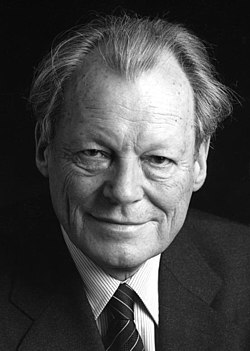First Cabinet of Willy Brandt Cabinet Brandt I | |
|---|---|
| 8th Cabinet of the Federal Republic of Germany | |
| 22 October 1969 – 13 December 1972 (until 15 December 1972 as caretaker government) | |
 | |
| Date formed | 22 October 1969 |
| Date dissolved | 15 December 1972 (3 years, 1 month, 3 weeks and 2 days) |
| People and organisations | |
| President | Gustav Heinemann |
| Chancellor | Willy Brandt |
| Vice-Chancellor | Walter Scheel |
| Member party | Social Democratic Party Free Democratic Party |
| Status in legislature | Coalition government |
| Opposition party | Christian Democratic Union Christian Social Union |
| Opposition leader |
|
| History | |
| Election | 1969 West German federal election |
| Legislature terms | 6th Bundestag |
| Predecessor | Kiesinger |
| Successor | Brandt II |
The First Brandt cabinet was the government of West Germany between 22 October 1969 and 15 December 1972, during the 6th legislature of the Bundestag. Led by the Social Democrat Willy Brandt, the cabinet was a coalition between the Social Democrats (SPD) and the Free Democratic Party (FDP). The Vice-Chancellor was the Free Democrat Walter Scheel (FDP).